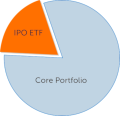Two noteworthy IPO filings submitted by Freescale Semiconductor (FSHI) and Pandora Media (PNDR) marked the end of a busy week for the US IPO market, during which seven companies successfully completed their deals. Though both are high-profile offerings, Freescale and Pandora are extremely different companies with characteristics that reflect the typical private equity and venture capital-backed deals commonly seen in the IPO market.
Freescale Semiconductor is an established company with roots dating back to the 1940s, when it first started out as a division of Motorola. Over the years, it has grown into a global leader in embedded processing semiconductors and solutions and now boasts a 30% share of the market. With a diverse portfolio that includes embedded processing products (e.g. microcontrollers and microprocessors) as well as complementary semiconductor products (e.g. RF, power management, analog, mixed-signal devices and sensors), the company now serves more than 18,000 customers. Though sales fell 33% in 2009 due to the economic downturn, business rebounded in 2010 with a 27% increase in sales to $4.5 billion, with $1.1 billion in Adjusted EBITDA (26% margin).
Freescale was acquired in 2006 by a consortium of private equity investors including Blackstone, Carlyle, Permira and TPG in what was one of the largest semiconductor LBOs in history at $17.6 billion. It now intends to return to the public markets in a deal that could raise as much as $1.1 billion in gross proceeds. As with many PE-backed IPOs, net proceeds will be used to pay down debt, of which it had $7.6 billion outstanding as of December 31, 2010. Citi and Deutsche Bank Securities are the lead underwriters on the deal.
Pandora Media is the leading Internet radio company in the US with a 50% share (in terms of listening time) among the top 20 stations and networks in the country. As of last month, it had 80 million registered users, more than double the number of users it reported at the end of 3Q10. Unlike Freescale, Pandora is a relatively young company: it was founded in 2000 as TheSavageBeast.com before changing its name in 2005, when it launched its well-known Music Genome Project, which uses proprietary algorithms to create music content tailored to the tastes of each individual user. Since 2005, its listeners have created over 1.4 billion stations using its unique technology, which provides access to over 800,000 songs by more than 80,000 artists.
With backing from venture firms such as Crosslink Capital (23%), Walden Venture Capital (19%) and Greylock Partners (14%), all of which most recently invested in August 2010, the company has grown rapidly over the past few years. For the nine months ended October 31, 2010, it booked $90 million in sales (86% advertising; 14% subscription services), nearly triple the $31 million it booked during the year-ago period. Pandora intends to use a portion of the IPO proceeds to redeem convertible preferred stock. Morgan Stanley and J.P. Morgan are acting as the lead managers on the deal.
The US IPO market has already seen the return of sizeable PE-backed IPOs this year after a sluggish 2010, with offerings by Kinder Morgan (KMI; $2.9 billion), BankUnited (BKU; $783 million) and Nielsen Holdings (NLSN, $1.6 billion). Dynamic PE activity will likely continue as both US and global companies look to monetize investments made during the LBO boom. Notable PE-backed IPOs in the pipeline include Skype (SKP), Toys "R" Us (TOYS), HCA (HCA) and GNC (GNC). By comparison, VC-backed issuance rebounded last year with 61 completed deals, up five-fold from 2009. We expect to see an extension of this trend given the large number of venture-backed IPOs in the pipeline, which include the likes of Kayak Software (KYAK), Tudou Holdings (TUDO) and ZipCar (ZIP). Performance exhibited by companies such as Freescale and Pandora will act as a litmus test of IPO investor appetite and may motivate similar private equity and venture-backed companies to approach the public markets.


